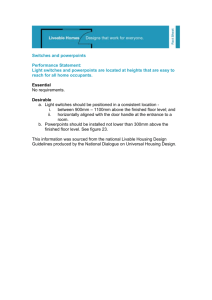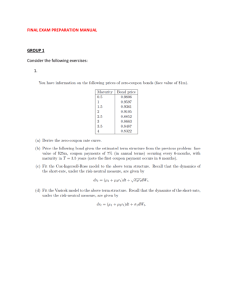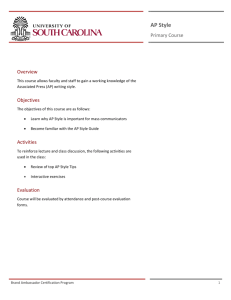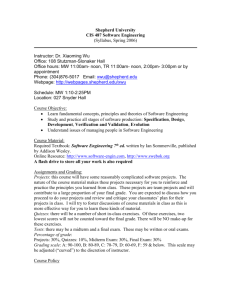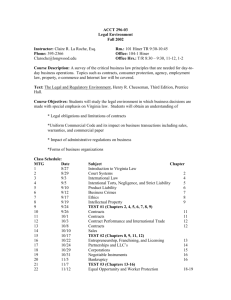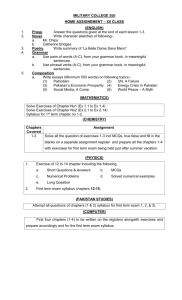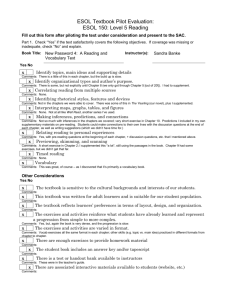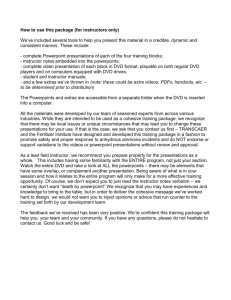ACCT 210 01 - Introduction to Accounting 1
advertisement
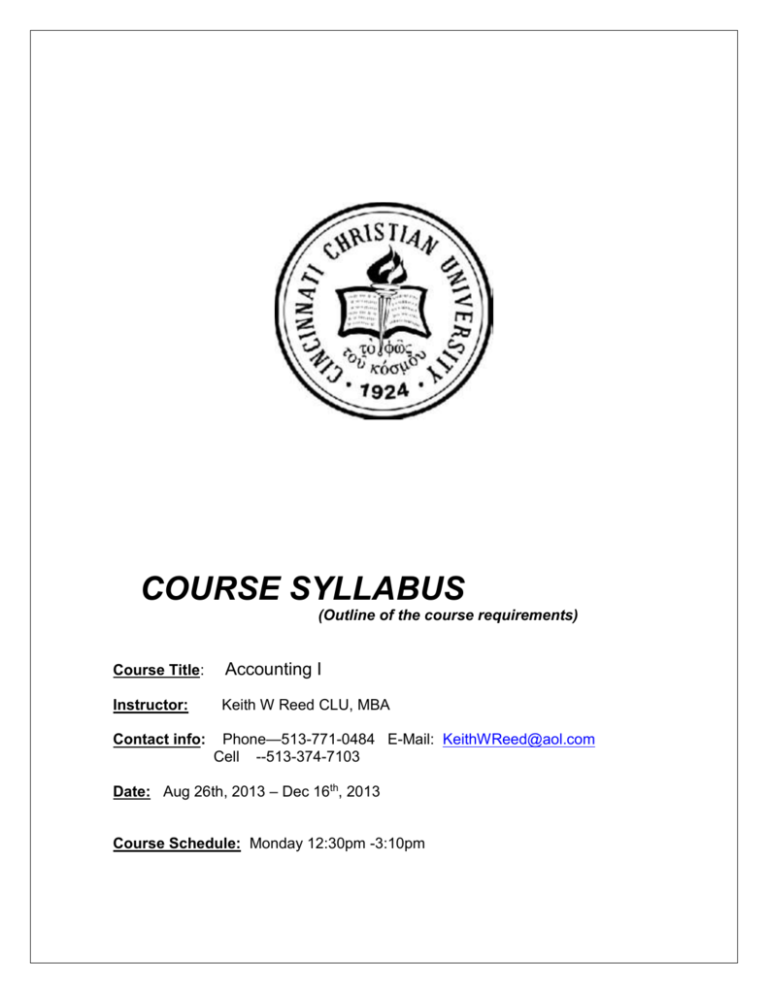
COURSE SYLLABUS (Outline of the course requirements) Course Title: Accounting I Instructor: Keith W Reed CLU, MBA Contact info: Phone—513-771-0484 E-Mail: KeithWReed@aol.com Cell --513-374-7103 Date: Aug 26th, 2013 – Dec 16th, 2013 Course Schedule: Monday 12:30pm -3:10pm Accounting I 1 Instructor Bio Mr. Reed earned his B.S. in Management from McNeese State University in Lake Charles, Louisiana in 1973, his Charter Life Underwriter designation from The American College in 1982, and his MBA from the University of Phoenix in 2006. Keith has served in many management capacities over his 35 years in business including owning his own Temporary Employment Service Agency and Financial Services Companies. After entering management in 1976, Mr. Reed has developed a number of Business Units for large insurance companies. He has served as a President of his own companies, Regional Manager, Territorial Manager, Recruiting Manager, Compliance Manager, and Sales VP. Keith is currently serving as President of LifeTime Strategies Group Agency in Cincinnati. Course Description The student is introduced to the fundamental principles, concepts, terminology and procedures of business accounting. Topics include financial statements, internal control design and accounting for partnerships. Learning Objectives Upon completion of this course, the successful student will be able to: Have a solid understanding of the fundamentals and language of the accounting cycle (Chapters 1-4) Define terms related to business accounting (Chapters 1-11, by examination) Apply accounting principles and concepts (Chapters 1-11, by examinations and homework) Analyze business transactions for decision making (Chapters 1-11, homework) Prepare financial statements (Chapters 4-11, homework) Evaluate business performance (Chapters 5-11, homework and in class problems) Evaluate internal controls (Chapter 8, homework and in class problems) 1 Accounting I 2 Prerequisites None Instructional Materials and References Accounting Chapters 1-11, 10 Edition Horngren's Accounting: Nobles, Mattison, and Matsumura Pearson; 2014 Instructional Methods A variety of teaching strategies will be utilized throughout the course. These might include, but are not limited to daily lectures, classroom discussions, simulations, case studies, classroom exercises, demonstrations, and assessments. The use of multimedia such as audio visual aids, DVDs, CDs, and internet sites might be inserted as appropriate during each teaching-learning activity. Assessment Criteria & Method of Evaluating Students Grade Distribution Letter grades will be assigned based on the published grade point system in the CCU Academic Catalog. Grades will be comprised of the following: Assignments 20% Tests I&II(10% each) 20% Midterm 20% Final 25% Attendance/Participation 15% Professionalism Students are expected to come each week prepared to contribute their knowledge and insights. We will all learn from each other. Students are expected to act in a professional manner, meeting deadlines, solving problems, cooperating with classmates and generally contributing in a positive way to the class. Working in the real world often means searching for solutions in a group context. Teamwork, listening, empathy, enthusiasm, emotional maturity and consideration of other people's concerns are essential to success. Please bring 2 Accounting I 3 these qualities and values with you to class. It is as important to 'practice' these interpersonal skills as it is to learn new intellectual content. Students will be evaluated on their professional demeanor in class. ATTENDANCE AND ACADEMIC INTEGRITY In an online class, regular and active participation is essential and will be monitored. Get in the habit of checking in daily with the course. A failure to be highly active in the course will result in a grade reduction. Likewise, policies regarding academic integrity as published in the CCU student handbook will apply in this course. Disabilities and Special Accommodations Students who require academic accommodations due to any documented physical, psychological, or learning disability should request assistance from the Academic Support Director, Marie Reeves, within the first two weeks of class. The Academic Support Office is located in the lower level of the Worship and Ministry Building (room 153). You may also contact the office by phone (2448420) Attendance Consult the academic catalog for the University’s attendance policy. Students with more than two weeks (6 class periods) of absence will be given a grade of FA. Requirements for Successful Completion of the Course At a minimum, students must achieve the following: a passing grade of D or above completion of all required examinations, submission of all required lab exercises and projects, and adherence to the school attendance policy. Any student absent during a pre-assigned test/exam and/or projects date will receive zero as a grade. Make up will be given only for excused absences. Make up work is the student's responsibility. The student must arrange with the instructor a correct time and place to accomplish the make up work. It is the students‟ responsibility to seek the instructor's guidance at the time when a problem area is initially encountered, not after receiving an unsatisfactory grade. Arrangements for the special tutoring must be made with the appropriate educational staff, i.e. instructor, education supervisor or academic dean. Make up work, instructor guidance, and special tutoring is provided at no additional cost to the student. Disclaimer 3 Accounting I 4 The course outline provides a general flow of the content. The instructor reserves the right to modify the schedule or content as necessary. COURSE OUTLINE WEEK 1: 08/26/2013 Class will begin with a thorough explanation of the Syllabus and rules of the class. Chapter 1 Accounting and the Business Environment 1. Intro to course 2. In-Class: E 1-19,20,21,22 and 25 Homework: Read Chapters 1 & 2. Also Problems Group A (using My Accounting Lab for correct paperwork & forms). WEEK 2: 09/02/2013 ***** LABOR DAY****** NO CLASS WEEK 3: 09/09/2013 Chapter 2: Recording Business Transactions. 1. 2. 3. 4. Review Chapter 1 and homework Discuss Chapter 2- Lecture and PowerPoints Pg 87 Trial Balance & Pg 92- Review In Class Exercises 2-10,11,12,13, 14, 15 Homework: Read Chapter 3 and complete Group Problem B pg 119-all. WEEK 4: 09/16/2013 Chapter 3: The Adjusting Process. 1. 2. 3. 4. Review Chapter 2 and homework Discuss Chapter 3- Lecture and PowerPoints Review pg 163 In Class Exercises S3-1 through S20-24 Homework: Read Chapter 4, complete Group Problem A, and STUDY FOR TEST Chapters1-3. WEEK 5: 09/23/2013 **TEST** 4 Accounting I 5 Chapter 4: Completing the Accounting Cycle 1. 2. 3. 4. Take Test Review Chapter 3 and homework Discuss Chapter 4- Lecture and PowerPoints In Class Exercises pg 241 S4-1 through 3, E4-14, & E4-15 Homework: Read Chapter 5 and Group Problem B. WEEK 6: 09/30/2013 CATCH UP DAY! WEEK 7: 10/07/2013 Chapter 5: Merchandising Operations 1. Review Chapter 4 and homework 2. Chapter 5- Lecture and PowerPoints 3. In Class Exercises S5-5 through S5-7 & E5-16,17,18. Homework: Read Chapter 6 and Group Problem A. WEEK 8: 10/14/2013 Chapter 6: Merchandise Inventory 1. Chapter 6- Lecture and PowerPoints Homework: STUDY FOR MIDTERM! Read Chapter 7 and Group Problem B. WEEK 9: 10/21/2013 ****MIDTERM**** Chapter 7: Accounting Information Systems 1. Review Chapter 6 and homework 2. Chapter 7- Lecture and PowerPoints 3. In Class Exercises E7-14 through E7-17, E7-21 and 22 Homework: Read Chapter 8 and Group Problem A. WEEK 10: 10/28/2013 WEEK 11: 11/04/2013 CATCH UP DAY! Chapter 8: Internal Control and Cash 1. Review Chapter 7 and homework 2. Chapter 8- Lecture and PowerPoints Homework: Read Chapter 9, and Group Problem B. 5 Accounting I 6 WEEK 12: 11/11/2013 Chapter 9: Receivables 1. Review Chapter 8 and homework 2. Chapter 9- Lecture and PowerPoints 3. In Class Exercises E9-1 through 7 Homework: Study for Test, Read Chapter 10 and Group Problem A. WEEK 13: 11/18/2013 *** TEST*** Chapter 10: Plant Assets, Natural Resources, and Intangibles 1. Review Chapter 9 and homework 2. Chapter 10- Lecture and PowerPoints Homework: Read Chapter 11 and do all Exercises. WEEK 14: 11/25/2013 **THANKSGIVING RECESS** NO CLASS WEEK 15: 12/02/2013 Chapter 11: Current Liabilities and Payroll 1. Review Chapter 10 and homework 2. Chapter 11- Lecture and PowerPoints Homework: Group Problem A. WEEK 16: 12/09/2013 FINAL REVIEW DAY WEEK 17: 12/16/2013 ****FINAL EXAM**** 6

